Unit 1 Where did you go on vacation? 第2课时课件Section A Grammar Focus-3c(39张)
文档属性
| 名称 | Unit 1 Where did you go on vacation? 第2课时课件Section A Grammar Focus-3c(39张) | 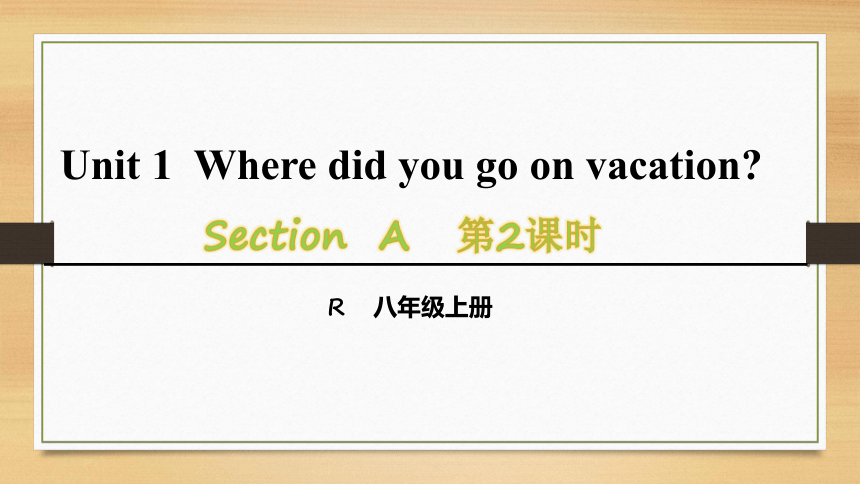 | |
| 格式 | zip | ||
| 文件大小 | 9.4MB | ||
| 资源类型 | 教案 | ||
| 版本资源 | 人教新目标(Go for it)版 | ||
| 科目 | 英语 | ||
| 更新时间 | 2019-10-28 10:16:33 | ||
图片预览


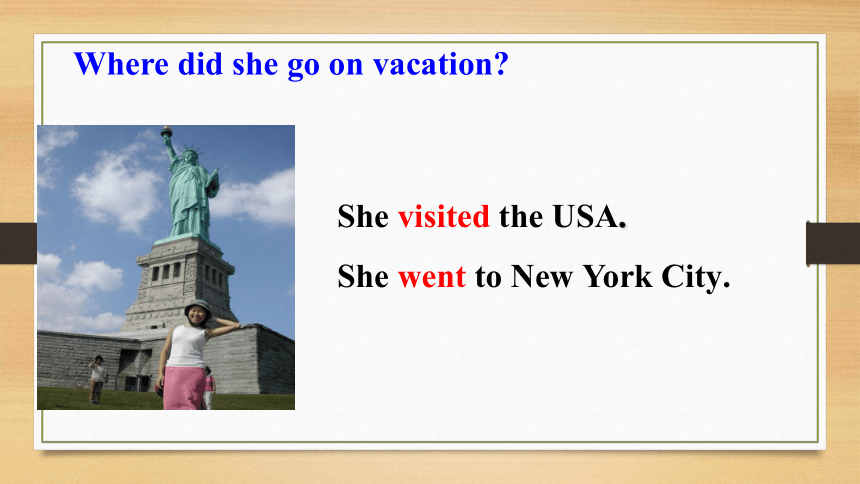
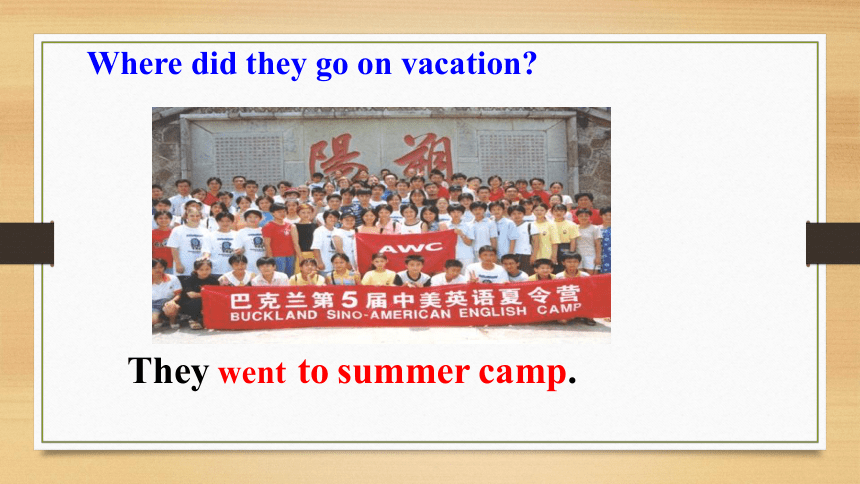


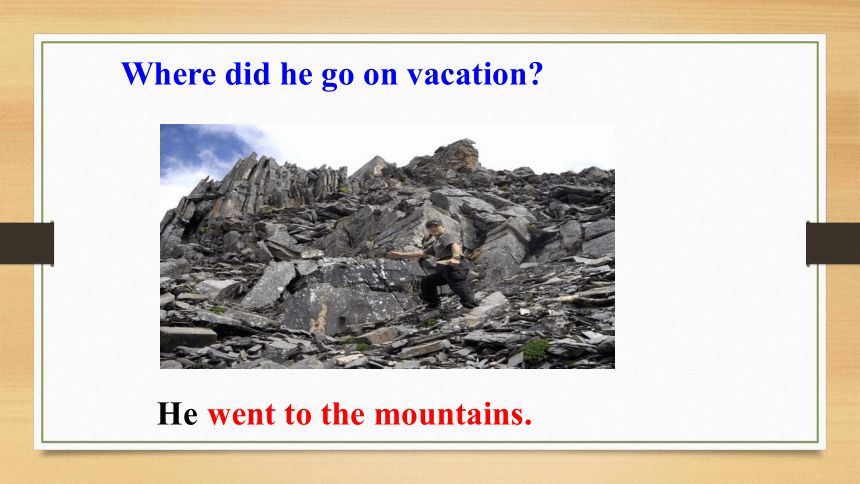
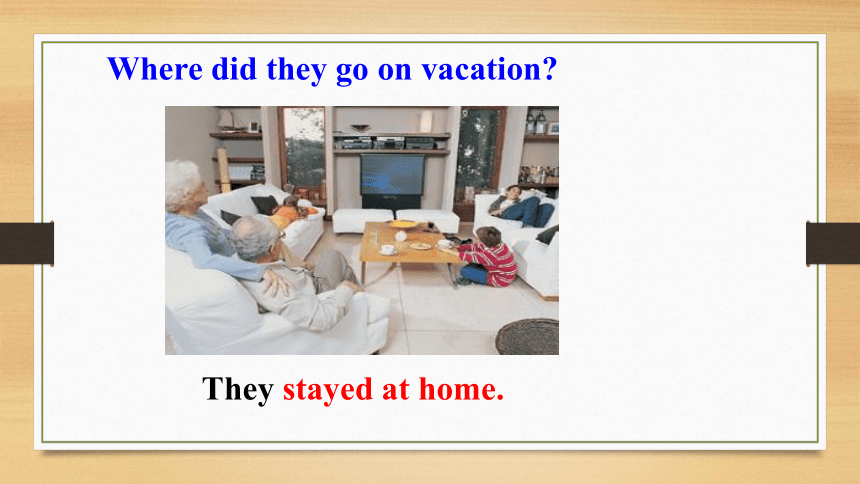
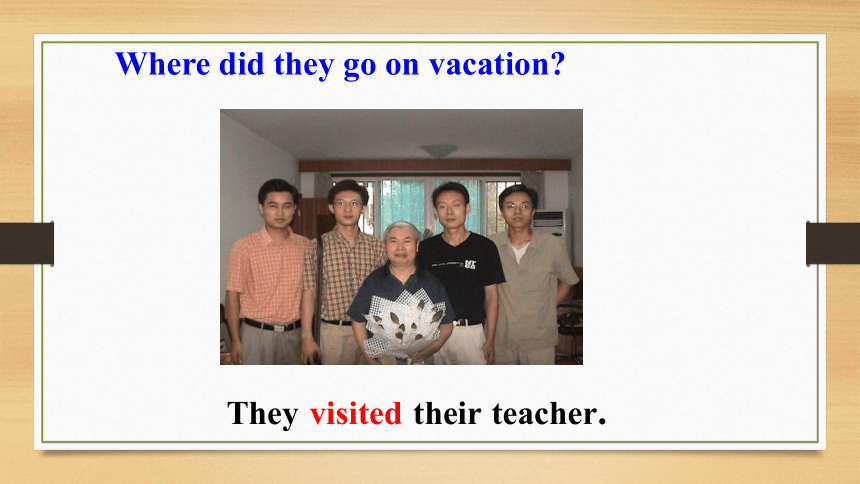
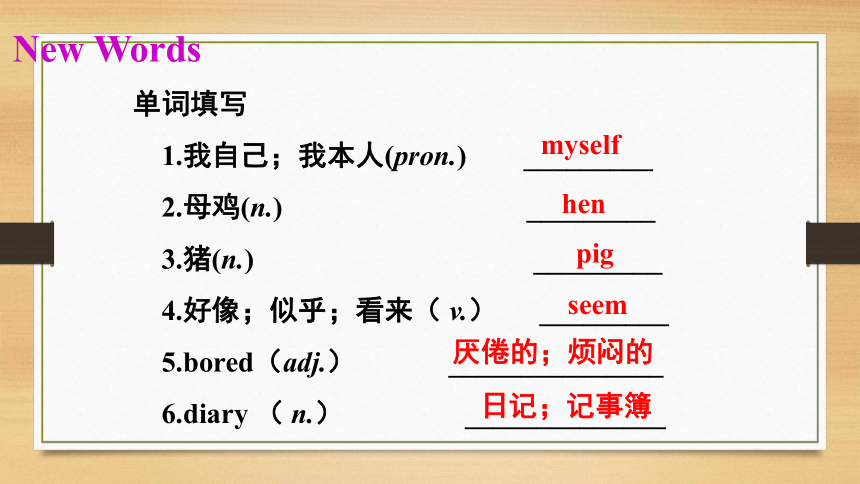
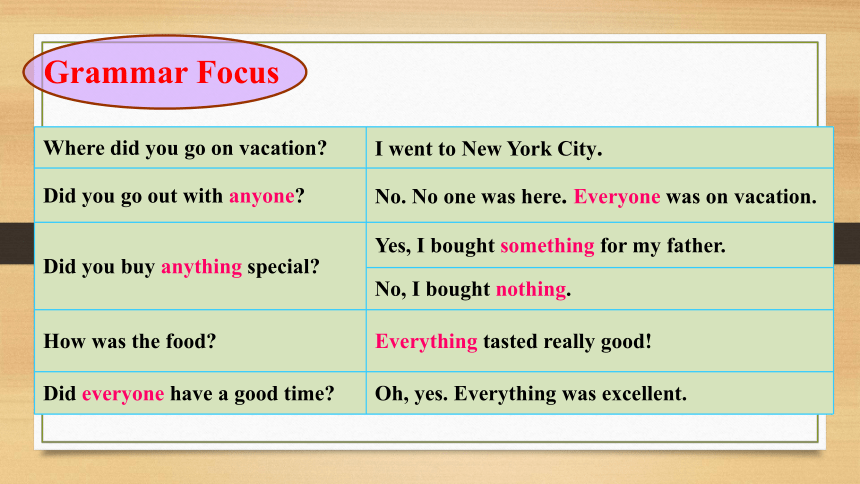
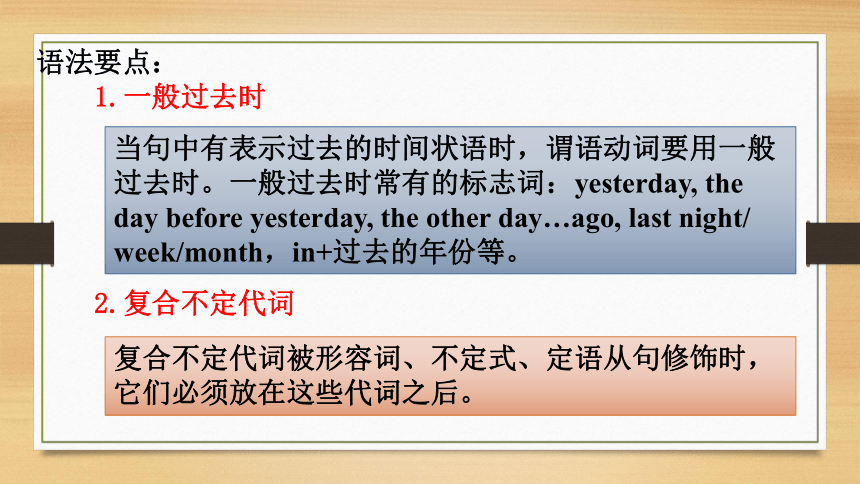
文档简介
课件39张PPT。Unit 1 Where did you go on vacation?R 八年级上册Section A 第2课时 Where did you go on vacation?I went to the Great Wall.Review She visited the USA.
She went to New York City.Where did she go on vacation?They went to summer camp. Where did they go on vacation?Where did they go on vacation?They went to the museum.Where did you go on vacation?I went to Beijing City.He went to the mountains.Where did he go on vacation?Where did they go on vacation?They stayed at home.They visited their teacher.Where did they go on vacation?New Words单词填写
1.我自己;我本人(pron.) _________
2.母鸡(n.) _________
3.猪(n.) _________
4.好像;似乎;看来( v.) _________
5.bored(adj.) _______________
6.diary ( n.) ______________myselfhenpigseem厌倦的;烦闷的日记;记事簿语法要点:
1.一般过去时
2.复合不定代词当句中有表示过去的时间状语时,谓语动词要用一般过去时。一般过去时常有的标志词:yesterday, the day before yesterday, the other day…ago, last night/ week/month,in+过去的年份等。复合不定代词被形容词、不定式、定语从句修饰时,它们必须放在这些代词之后。 一般过去时 结构一:谓语是be
用法:描述过去发生的动作、存在的状态以及过去发生的事情。例句:I was thirteen years old last year. 我去年13岁。
We have a good time in the park last week.
我们上周在公园里玩得很开心。肯定句: 主语﹢was/were…
否定句:主语﹢wasn’t/weren’t…
疑问句:Was/Were﹢主语…?结构二:谓语是行为动词
用法:描述过去一段时间内经常或习惯性的动作;常与频率
副词连用。例句:I always walked to school in the past.
过去我总是步行上学。肯定句:主语﹢动词的过去式….
否定句:主语﹢didn’t ﹢动词原形.
疑问句: Did﹢主语﹢动词原形? 复合不定代词1.定义:
由some, any, no, every加上-one, -body, -thing构成复合代词。我们称之为复合不定代词。2.常见的复合不定代词3.用法:
(1) 相当于名词,可作主语、宾语和表语,不做定语;作主语时谓语要用单数形式。
例: 今天我没有什么可讲的。
I have nothing to say today?
世上无难事,只怕有心人。
Nothing is difficult if you put your heart into it.
没什么。(作宾语) (作主语) That is nothing. (作表语) (2) somebody/someone/something一般用于肯定句,
而anybody/anyone/anything一般用于否定句、疑问句或条
件状语从句。
例:某人正在唱歌。
我们现在不能作出任何决定。
你要是需要什么,请给我打电话。Someone /Somebody is singing a song. We can’t decide anything now. If you want anything, please call me.(3)复合不定代词被形容词、不定式、定语从句修饰时,它们
必须放在这些代词之后。
例:There is nothing wrong with the machine.
这台机器有问题。
Do you want anything to drink.
你想喝点什么吗?
If there is anything I can do for you , tell me.
如果有什么我能帮你的,请告诉我。中考对接
(1)(湖北武汉中考)—That’s a nice mobile phone.
— It is . My aunt ____ it for my last birthday.
A. buy B. will buy
C. have bought D. bought
(2)(江苏南京中考)I was looking for a birthday gift for
my mother, but I couldn’t find ____suitable.
A. something B. anything
C. nothing D. everythingLanguage points Everything tasted really good !
所有的东西尝起来真的很好吃!
taste在此为系动词,意为“尝起来”,其后接形容词。
e.g. The food tastes really great.
食物尝起来棒极了。
The milk tasted terrible.
牛奶尝起来很糟糕。2.Did everyone have a good time? 大家玩得开心吗 ?
have a good time = enjoy oneself
= have fun 玩得开心 (+ doing)
eg: We had a good time visiting the Great Wall.
= We ______ ________ ______ the the Great Wall.
= We ____ _____ _______the Great Wall. enjoyed ourselves visitinghad fun visitinganyone, something, anything, everything , nothingLinda: Did you do ________ fun on your vacation, Alice?
Alice: yes, I did. I went to Sanya.
Linda: How did you like it?
Alice: Well, it was my first time there. So __________ was
really interesting.anythingeverythingLinda: Did you go with__________?
Alice: Yes, I did. I went with my sister.
Linda: Did you go shopping?
Alice: Of course! I bought _________ for my parents, but
__________ for myself.
Linda: Why didn’t you buy__________ for yourself?
Alice: I didn’t really see _________ I liked.anyonesomethinganythingnothinganythinganyone, something, anything, everything , nothing1. How did you like it? 你觉得它怎么样?
How do/did you like…? “你觉得……怎样?”,用来询问对方的观点或看法,相当于 What do you think of…?或How do you feel about…?
e.g. How do you like your new job?你觉得你的工作怎么样?
= ____ ___ ____ _____ ___ your new job?
= ____ ____ ____ ____ _____ your new job?What do you think ofHow do you feel aboutLanguage points2.Did you go shopping? 你们去购物了吗?
go shopping: 去购物;去买东西
相当于do some shopping. (同义短语)
e.g. 我通常星期天去购物。
I usually go shopping on Sundays.拓展:“go + doing”形式表示“去做某事”,常用于表达从事某一体育活动或休闲活动。
go bike riding 骑自行车旅行 go climbing去爬山
go skating去滑冰 go hiking去远足
go sightseeing去观光 go fishing去钓鱼
go swimming去游泳 go camping去野营
go boating去划船 go surfing去冲浪
go skateboarding去进行滑板运动 anything, everything, nothing, everyone, no one Dear Bill,
How was your vacation? Did you do _________ interesting? Did ________ in the family go with you? I went to a friend’s farm in the countryside with my family. ___________ was great. anythingeveryoneEverythingWe fed some hens and saw some baby pigs. They were so cute! The only problem was that there was _______ much to do in the evening but read. Still _________ seemed to be bored. Bye for now!
Markanything, everything, nothing, everyone, no one nothingno oneLanguage points1.The only problem was that there was nothing much to do in the evening but read.
唯一的问题是晚上除了读书没什么事可做。
nothing much to do意为“没什么事可做”。
a. I have________ _____ __ ____this afternoon.
今天下午我没什么特殊的事可做。
b. There is _______ ______ __ ____,so I go to bed early.
没什么事可做,因此我就早早睡觉了。
nothing much to donothing much to do拓展:nothing…but…意为“除……之外什么也没有;只有”。but后可接名词或动词原形。
a. I had nothing but a cup of tea this morning.
我今天早上只喝了杯茶。
b. I had nothing to do but watch TV.
我无事可做,只有看电视。2.Still no one seemed to be bored.
(即使这样)仍然没有人看起来无聊。
1)seem不及物动词或系动词,“好像;似乎;看来”。
eg: Everything seems easy. 一切似乎很容易。
The cake seems very delicious.
那块蛋糕看上去很美味。拓展:
seem+adj. “看起来……”。
You seem happy today. 你今天看起来很高兴。
seem+to do sth. “似乎,好像做某事”。
I seem to have a cold. 我似乎感冒了。
It seems/seemed+从句 “看起来好像……;似乎……”。
It seems that no one believes you.
看起来好像没有人相信你。
seem like… “好像,似乎……”。
It seems like a good idea. 它好像是个好主意。2)辨析:bored与boring
a. bored意为“厌烦的;感到无聊的”,
一般在句中修饰人,作表语。
b. boring意为“无聊的;令人厌烦的”,
一般在句中修饰事或物,可作表语和定语。
eg:a. I’m _____ with what he said.
我对他说的话厌烦极了。
b. I find the story very _________.
我发现这个故事太无聊了。boredboringReport like this In our group, everyone ate something at a restaurant. No one reads anything interesting. Li Lei visits his grandparents in the town. Everyone buys something interesting. Xiang Hua keeps a diary. Ask your classmates , then give us your
group result!Exercise单项选择。
1. Do you have _____ to do this evening?
A. important something B. anything important
C. something important
2. _____ is watching TV. Let’s turn it off .
A . Somebody B. Anybody C. Nobody
3.—What ____ the noise, Bill? —Sorry, I broke my glass.
A. is B. was C. are D. were4. Would you like ___? I can get it for you .
A. something else B. anything else
C. everything else
5.I agree with most of what you said, but I don't agree with
______.
A. everything?????? ?B. anything???????????
C. something??????? ? D. nothing1. Lucy did her homework yesterday evening. (改为否定句)
Lucy ______ __ _____ ____________ yesterday evening.
2. Jim went to the beach last Sunday. (对画线部分提问)
_____ _____ Jim ______ last Sunday?
3. They played basketball yesterday. (对画线部分提问)
________ _______ they play basketball?
4. The students had great fun in the park. (改为同义句)
The students ____ __ ___________ ______ in the park.didn’t do her homeworkWhat did do 根据要求改写下列句子。 When didhad a good / great time
She went to New York City.Where did she go on vacation?They went to summer camp. Where did they go on vacation?Where did they go on vacation?They went to the museum.Where did you go on vacation?I went to Beijing City.He went to the mountains.Where did he go on vacation?Where did they go on vacation?They stayed at home.They visited their teacher.Where did they go on vacation?New Words单词填写
1.我自己;我本人(pron.) _________
2.母鸡(n.) _________
3.猪(n.) _________
4.好像;似乎;看来( v.) _________
5.bored(adj.) _______________
6.diary ( n.) ______________myselfhenpigseem厌倦的;烦闷的日记;记事簿语法要点:
1.一般过去时
2.复合不定代词当句中有表示过去的时间状语时,谓语动词要用一般过去时。一般过去时常有的标志词:yesterday, the day before yesterday, the other day…ago, last night/ week/month,in+过去的年份等。复合不定代词被形容词、不定式、定语从句修饰时,它们必须放在这些代词之后。 一般过去时 结构一:谓语是be
用法:描述过去发生的动作、存在的状态以及过去发生的事情。例句:I was thirteen years old last year. 我去年13岁。
We have a good time in the park last week.
我们上周在公园里玩得很开心。肯定句: 主语﹢was/were…
否定句:主语﹢wasn’t/weren’t…
疑问句:Was/Were﹢主语…?结构二:谓语是行为动词
用法:描述过去一段时间内经常或习惯性的动作;常与频率
副词连用。例句:I always walked to school in the past.
过去我总是步行上学。肯定句:主语﹢动词的过去式….
否定句:主语﹢didn’t ﹢动词原形.
疑问句: Did﹢主语﹢动词原形? 复合不定代词1.定义:
由some, any, no, every加上-one, -body, -thing构成复合代词。我们称之为复合不定代词。2.常见的复合不定代词3.用法:
(1) 相当于名词,可作主语、宾语和表语,不做定语;作主语时谓语要用单数形式。
例: 今天我没有什么可讲的。
I have nothing to say today?
世上无难事,只怕有心人。
Nothing is difficult if you put your heart into it.
没什么。(作宾语) (作主语) That is nothing. (作表语) (2) somebody/someone/something一般用于肯定句,
而anybody/anyone/anything一般用于否定句、疑问句或条
件状语从句。
例:某人正在唱歌。
我们现在不能作出任何决定。
你要是需要什么,请给我打电话。Someone /Somebody is singing a song. We can’t decide anything now. If you want anything, please call me.(3)复合不定代词被形容词、不定式、定语从句修饰时,它们
必须放在这些代词之后。
例:There is nothing wrong with the machine.
这台机器有问题。
Do you want anything to drink.
你想喝点什么吗?
If there is anything I can do for you , tell me.
如果有什么我能帮你的,请告诉我。中考对接
(1)(湖北武汉中考)—That’s a nice mobile phone.
— It is . My aunt ____ it for my last birthday.
A. buy B. will buy
C. have bought D. bought
(2)(江苏南京中考)I was looking for a birthday gift for
my mother, but I couldn’t find ____suitable.
A. something B. anything
C. nothing D. everythingLanguage points Everything tasted really good !
所有的东西尝起来真的很好吃!
taste在此为系动词,意为“尝起来”,其后接形容词。
e.g. The food tastes really great.
食物尝起来棒极了。
The milk tasted terrible.
牛奶尝起来很糟糕。2.Did everyone have a good time? 大家玩得开心吗 ?
have a good time = enjoy oneself
= have fun 玩得开心 (+ doing)
eg: We had a good time visiting the Great Wall.
= We ______ ________ ______ the the Great Wall.
= We ____ _____ _______the Great Wall. enjoyed ourselves visitinghad fun visitinganyone, something, anything, everything , nothingLinda: Did you do ________ fun on your vacation, Alice?
Alice: yes, I did. I went to Sanya.
Linda: How did you like it?
Alice: Well, it was my first time there. So __________ was
really interesting.anythingeverythingLinda: Did you go with__________?
Alice: Yes, I did. I went with my sister.
Linda: Did you go shopping?
Alice: Of course! I bought _________ for my parents, but
__________ for myself.
Linda: Why didn’t you buy__________ for yourself?
Alice: I didn’t really see _________ I liked.anyonesomethinganythingnothinganythinganyone, something, anything, everything , nothing1. How did you like it? 你觉得它怎么样?
How do/did you like…? “你觉得……怎样?”,用来询问对方的观点或看法,相当于 What do you think of…?或How do you feel about…?
e.g. How do you like your new job?你觉得你的工作怎么样?
= ____ ___ ____ _____ ___ your new job?
= ____ ____ ____ ____ _____ your new job?What do you think ofHow do you feel aboutLanguage points2.Did you go shopping? 你们去购物了吗?
go shopping: 去购物;去买东西
相当于do some shopping. (同义短语)
e.g. 我通常星期天去购物。
I usually go shopping on Sundays.拓展:“go + doing”形式表示“去做某事”,常用于表达从事某一体育活动或休闲活动。
go bike riding 骑自行车旅行 go climbing去爬山
go skating去滑冰 go hiking去远足
go sightseeing去观光 go fishing去钓鱼
go swimming去游泳 go camping去野营
go boating去划船 go surfing去冲浪
go skateboarding去进行滑板运动 anything, everything, nothing, everyone, no one Dear Bill,
How was your vacation? Did you do _________ interesting? Did ________ in the family go with you? I went to a friend’s farm in the countryside with my family. ___________ was great. anythingeveryoneEverythingWe fed some hens and saw some baby pigs. They were so cute! The only problem was that there was _______ much to do in the evening but read. Still _________ seemed to be bored. Bye for now!
Markanything, everything, nothing, everyone, no one nothingno oneLanguage points1.The only problem was that there was nothing much to do in the evening but read.
唯一的问题是晚上除了读书没什么事可做。
nothing much to do意为“没什么事可做”。
a. I have________ _____ __ ____this afternoon.
今天下午我没什么特殊的事可做。
b. There is _______ ______ __ ____,so I go to bed early.
没什么事可做,因此我就早早睡觉了。
nothing much to donothing much to do拓展:nothing…but…意为“除……之外什么也没有;只有”。but后可接名词或动词原形。
a. I had nothing but a cup of tea this morning.
我今天早上只喝了杯茶。
b. I had nothing to do but watch TV.
我无事可做,只有看电视。2.Still no one seemed to be bored.
(即使这样)仍然没有人看起来无聊。
1)seem不及物动词或系动词,“好像;似乎;看来”。
eg: Everything seems easy. 一切似乎很容易。
The cake seems very delicious.
那块蛋糕看上去很美味。拓展:
seem+adj. “看起来……”。
You seem happy today. 你今天看起来很高兴。
seem+to do sth. “似乎,好像做某事”。
I seem to have a cold. 我似乎感冒了。
It seems/seemed+从句 “看起来好像……;似乎……”。
It seems that no one believes you.
看起来好像没有人相信你。
seem like… “好像,似乎……”。
It seems like a good idea. 它好像是个好主意。2)辨析:bored与boring
a. bored意为“厌烦的;感到无聊的”,
一般在句中修饰人,作表语。
b. boring意为“无聊的;令人厌烦的”,
一般在句中修饰事或物,可作表语和定语。
eg:a. I’m _____ with what he said.
我对他说的话厌烦极了。
b. I find the story very _________.
我发现这个故事太无聊了。boredboringReport like this In our group, everyone ate something at a restaurant. No one reads anything interesting. Li Lei visits his grandparents in the town. Everyone buys something interesting. Xiang Hua keeps a diary. Ask your classmates , then give us your
group result!Exercise单项选择。
1. Do you have _____ to do this evening?
A. important something B. anything important
C. something important
2. _____ is watching TV. Let’s turn it off .
A . Somebody B. Anybody C. Nobody
3.—What ____ the noise, Bill? —Sorry, I broke my glass.
A. is B. was C. are D. were4. Would you like ___? I can get it for you .
A. something else B. anything else
C. everything else
5.I agree with most of what you said, but I don't agree with
______.
A. everything?????? ?B. anything???????????
C. something??????? ? D. nothing1. Lucy did her homework yesterday evening. (改为否定句)
Lucy ______ __ _____ ____________ yesterday evening.
2. Jim went to the beach last Sunday. (对画线部分提问)
_____ _____ Jim ______ last Sunday?
3. They played basketball yesterday. (对画线部分提问)
________ _______ they play basketball?
4. The students had great fun in the park. (改为同义句)
The students ____ __ ___________ ______ in the park.didn’t do her homeworkWhat did do 根据要求改写下列句子。 When didhad a good / great time
同课章节目录
- Unit 1 Where did you go on vacation?
- Section A
- Section B
- Unit 2 How often do you exercise?
- Section A
- Section B
- Unit 3 I'm more outgoing than my sister.
- Section A
- Section B
- Unit 4 What's the best movie theater?
- Section A
- Section B
- Unit 5 Do you want to watch a game show?
- Section A
- Section B
- Unit 6 I'm going to study computer science.
- Section A
- Section B
- Unit 7 Will people have robots?
- Section A
- Section B
- Unit 8 How do you make a banana milk shake?
- Section A
- Section B
- Unit 9 Can you come to my party?
- Section A
- Section B
- Unit 10 If you go to the party, you'll have a grea
- Section A
- Section B
